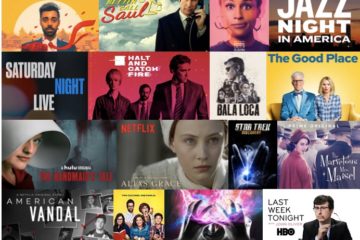Below are the Peabody Award winners and finalists for 2016, as announced in Spring 2017, along with some personal notes (including some hat-tips to the ones I especially adored).
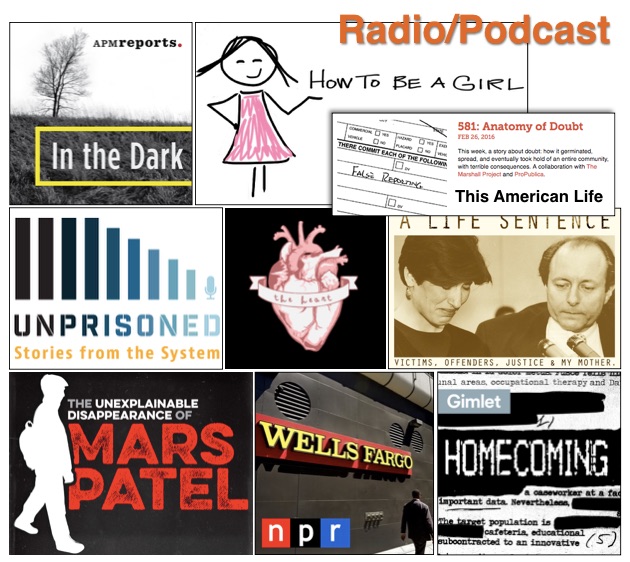
Winners
- In the Dark
- This American Life, “Anatomy of Doubt”
- “Wells Fargo Hurts Whistleblowers” (NPR report)
- The Unexplainable Disappearance of Mars Patel
Finalists
- How To Be a Girl
- The Heart: Silent Evidence Series
- Homecoming
- A Life Sentence: Victims, Offenders, Justice, and My Mother
- Unprisoned: Stories from the System
In the Dark was this year’s standout surprise for me: I’d heard nothing about it coming into the judging season, but it became one of my very favorites. Amazing reporting on the long “cold” case of the abduction of Jacob Wetterling in Minnesota in 1989, told just as the case was finally resolved with a plea bargain in 2016. Madeleine Baran fleet-footedly shows herself as able to engage with the broader issues at play in the case, as she is in excoriating a sheriff policing system that nationwide fails too many victims and their families. Gripping storytelling. You’ll often hear people note that it’s “kind of like Serial” in format, but if so, it is Empire Strikes Back to Serial’s Star Wars, proof that something really good can get even better.
I’m also a big fan of How To Be a Girl, a podcast by Marlo Mack (her pseudonym), mother to a young trans girl, about the challenges and rewards of parenting her daughter. It provides such a great service in openly and honestly sharing all sorts of information and moments, but it’s also really well edited and composed in ways that give her delightful daughter voice and personality, never reducing her to “an issue.” I appreciate, too, that ultimately it ends up being about parenting in general, and listening to How To Be a Girl regularly creates a reflective space for me to consider a wide range of things about parenting.
I was struck this year by a group of amazing audio pieces about rape, sexual assault, and their legacy. In the Dark was thus joined by This American Life’s excellent “Anatomy of Doubt” episode, nominally about two police departments dealing with the same rapist in very different ways, but at root a chilling reminder to trust the victim. The Heart’s Silent Evidence series sees Tennessee Williams confront her childhood sexual abuser, and reflect on the lasting damage enacted upon her. And A Life Sentence features Samantha Broun’s reporting upon a horrific attack on her mother in 1994, and on all that followed. Together, they showcase how podcasts and radio can tell intimate stories both beautifully and harrowingly. When political candidates can boast of molesting women and be elected for the highest office in the land, it’s important work for longer-form audio work like these to underline what costs a culture that too often implicitly condones sexual abuse enact upon its citizens.
The Unexplainable Disappearance of Mars Patel is really fun audio work for kids. If you’ve got a kid between the age of about 8 and 12, I can’t recommend this highly enough. It’s a great radio drama about strange disappearances at Pruitt Prep. Stranger Things justifiably got a lot of love and attention in 2016, but Mars Patel is its less creepy, still very fun audio equivalent for the kids themselves.
And if Mars Patel offers a lesser-known peer to Stranger Things, Unprisoned: Stories from the System offers a lesser-known peer to another much-lauded 2016 standout, 13th, with smaller length pieces about the criminal justice system in New Orleans. Eve Abrams covers a lot of ground and features many stories and issues with deft skill.
Homecoming, meanwhile, is another excellent radio drama. If you told me of a show with Catherine Keener, Oscar Isaac, and David Schwimmer, I’d never believe you if you then insisted Schwimmer offered the standout performance, but amazingly he does. Keener and Isaac, let’s be clear, are superb too in this tale about government experiments on memory and PTSD, but Schwimmer’s performance is both fun and chilling.
And “Wells Fargo Hurts Whistleblowers” offers yet another instance of NPR’s news team covering an important topic extremely well, going beyond the case at hand to offer context of banking sales culture in general.
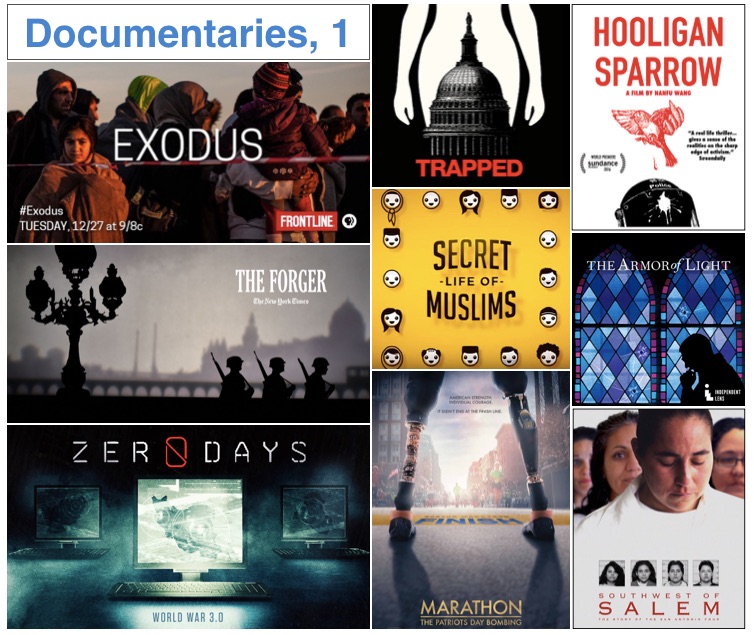
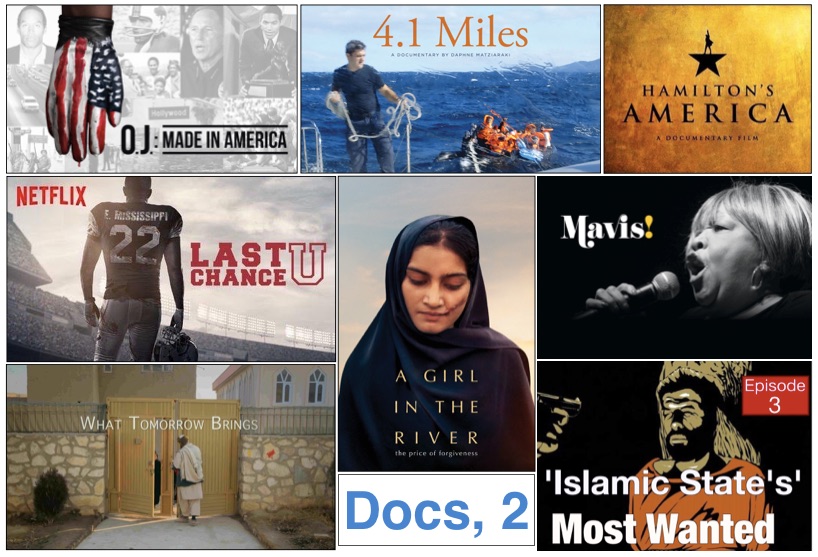
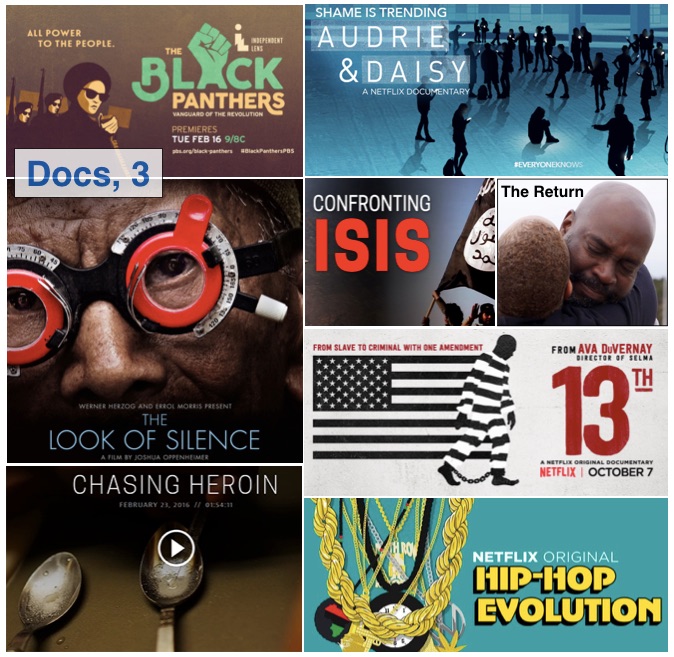
Winners
- 1 Miles
- 13th
- Audrie and Daisy
- Confronting ISIS (Frontline)
- Exodus
- Hip-Hop Evolution
- Hooligan Sparrow (POV)
- Mavis!
- OJ: Made in America
- Southwest of Salem: The San Antonio Four
- Trapped (Independent Lens)
- Zero Days
Finalists
- Armor of Light (Independent Lens)
- The Black Panthers (Independent Lens)
- Chasing Heroin
- The Forger
- A Girl in the River: The Price of Forgiveness
- Great Performances: Hamilton’s America
- “Islamic State’s” Most Wanted
- Last Chance U
- The Look of Silence (POV)
- Marathon: The Patriots Day Bombing
- The Return (POV)
- Secret Life of Muslims
- What Tomorrow Brings (POV)
This is an amazing group of docs. But too many for me to say something about each. Instead, then, let me highlight a few.
Exodus is a deeply moving look at refugees fleeing countries around the world. It’s really impressive in not Othering the refugees, though, boldly underlining upfront, for instance, that many people leave countries not because they’re poor but because it’s not safe to stay. It also allows its subjects senses of humor – as one family hike through the Balkans in the rain, they start making up a song about loving hiking in the rain, for example. And thus it trusts that the experience of being a refugee is harrowing enough that it doesn’t need to heap on cloying music, framing of pitiable creatures, and so forth. Indeed, I was struck by one of the refugee’s tales about leaving his country that is played near the very end of the documentary: throughout the film he has been a remarkably composed figure. But as he revisits this trauma in the telling, his body shakes all over. A lesser doc would have led with this interview, using it to grab the audience by the heart-strings immediately, but Exodus gives its subjects dignity and makes us earn this moment with him.
Audrie and Daisy was another standout doc for me, one that joins this year’s slate of outstanding audio pieces about rape to focus on the secondary (yet in felt terms, often primary) victimization of social media shaming. I discuss it elsewhere on my site, here, so I’ll simply point there for more comments.
And if several of those audio pieces were equally impactful for examining the legacy of crimes committed in the past, and the damage that lasts for decades, POV’s The Look of Silence joins them. A follow-up and companion piece to Joshua Oppenheimer’s amazing but deeply, deeply unsettling The Act of Killing, it follows an Indonesian man’s interviews with people who in 1965 slaughtered many Indonesians including his brother. His quiet resolve is chilling, though also a lone reprieve and counter-balance to the film’s otherwise brutal depiction of humanity.
13th hardly needs additional commentary here, given the plaudits it received far and wide, though I will underline and counter-sign that it’s an important documentary, and could be paired in viewing with POV’s more intimate The Return, about prisoners released after reform of California’s Three Strikes law. 13th covers a lot of ground, while The Return slows down to give testimony of the human damage to prisoners and their families.
Another doc that surely you’ve heard of is OJ: Made in America. But oh my god is this superb, alongside In the Dark, the best thing I encountered in the judging season. It’s long, but I challenge you to find any fat that could be cut. Rather, it’s a master class in interviewing, as seemingly everything any interviewee offers is eminently quotable. I feel like I “get” the case so much more now, but I also feel like I “get” race in America (or at least in LA) better. And while we’re using this doc to provide a class on race in America, Stanley Nelson’s The Black Panthers is also a superb historical doc that sheds all sorts of light on a drastically misunderstood, often-caricatured group.
Many other great docs in the group. Indeed, the number of them alone should signal the depth of quality in this category this year.

Winners
- “Arrested at School” (NBC Bay Area)
- CNN’s Coverage of ISIS
- “Charity Caught on Camera” (WTHR)
- “Dangerous Exposure” (WTHR)
- CBS Evening News, “Heart of an Epidemic”
Finalists
- “Big Buses, Bigger Problems: Investigating DCS” (KXAS)
- 60 Minutes, “The White Helmets”
- “Student Debt” (Vice)
Perhaps the first thing you’d note about the winners list is that two of the five come from the same channel, not a national network, not CNN, not the BBC, but Indianapolis’ WTHR. It’s really exciting and encouraging to see great local news as a Peabody Juror. Especially in a year in which much of the big coverage was turned towards the election, and in which much of that reporting was horrible, and a reason we ended up with the final result, it was refreshing to see local news reporters overcoming dwindling budgets to tell the stories that really matter locally. Here in particular, WTHR revealed a disgusting abuse of charitable donations, and poor oversight by environmental regulators of air, soil, and water contamination. Bad local news relies overmuch on dramatic music, overstatement, and repetition, but this outlet just roll up their sleeves and report the heck out of stories.
I was also impressed by CNN’s coverage of ISIS. Indeed, this is something of an omnibus award for a whole bunch of coverage. I’ve been following this “beat” closely through my three years on Peabody, watching all the excellent work on ISIS each of those years, and thus I feel I have a pretty high bar for what stands out as exceptional. I was especially excited here to see how many women reporters were central to these stories, showing that war coverage doesn’t require dudes with flak jackets. If you need to back up and get a primer on how we got here, Frontline’s Confronting ISIS doc is a highly deserving winner too, but then when you want to see what’s happening now, CNN is really delivering.

Winners
- Atlanta
- Better Things
- Happy Valley
- Horace and Pete
- Lemonade
- National Treasure
- Veep
Finalists
- American Crime
- Cleverman
- Marvel’s Luke Cage
- The Night Of
- Stranger Things
- This is Us
There are many things that make me proud to be part of Peabody, but one is that this group and this body really take comedy seriously. So much of the public rhetoric around “peak TV” is about superb scripted drama, but this list should intimate how great comedy is too. Better Things often fell off the page with FX’s marketing team, who championed The People vs. OJ, The Americans, and Atlanta far more often, but it’s damn, damn good. Pamela Adlon does for middle age white mom-hood what Louis CK did for middle age white dad-hood, and similarly can move from deeply funny material to deeply soulful, all seamlessly. Go watch it. Atlanta, though, deserved its FX hype, as a magic realist comedy with the inimitable Donald Glover leading an outstanding cast that all mark their comic moments as well as their dramatic ones.
The list also includes probably the most talked-about and lauded comedy of the last year, and the most criminally under-talked-about in Veep and Horace and Pete respectively. Veep’s a pleasure to watch, having refused to get tired and weary in later seasons and instead firing on all cylinders with a cast that have only more chemistry now. I’m not sure it’s “satire,” as it’s often called, but it does offer all sorts of release of tension surrounding politics. Horace and Pete, meanwhile, was dropped on Louis CK’s website, hence it being lesser-known. It boasts an amazing cast of Steve Buscemi, Alan Alda, CK, Jessica Lange, Laurie Metcalf, Edie Falco, Steve Wright, and more. It takes uncomfortable comedy and does something with it, delving deep into taboo and dark topics and able to adroitly address them all.
My three favorite dramas in the list are Happy Valley, American Crime (season 2), and Stranger Things. The former has arguably TV’s best female character (ever), written so well, acted so well, placed in scenes that don’t force Sarah Lancashire to work around them but that instead allow her to stand on their shoulders and reach further. There are superb moments in this series as a result, where we think we know what’s about to happen, based on information gleaned from a lifetime of watching cop shows written by men for male super-cops, yet the writers and Lancashire give us something altogether different. American Crime almost risks losing itself under the weight of so many issues, but to my mind it manages to stay afloat and in doing so offers a similarly rare and refreshing instance of a television drama finding ways to be truly intersectional and truly original in approach. I discuss it further over here. And Stranger Things owns the title of being easily the most fun thing on American television last year.
It was cool to see Lemonade awarded. I’m not a Beyonce fan, let me note; nor am I a hater, but I didn’t arrive at it with the glow of worship that seems to attend much Queen Bey media. It’s truly spectacular, though, something that exists outside of genre, that is political, that is often beautiful, that challenges music video to be so much more.
And let me give a shout-out to Cleverman, an Australian sci-fi show about Aboriginal Dreamtime in contemporary times. It’s wildly ambitious, and though it didn’t win, its finalist status is quite something. Anyone teaching classes on race and media should check it out, in particular, as should people who like smart sci-fi.

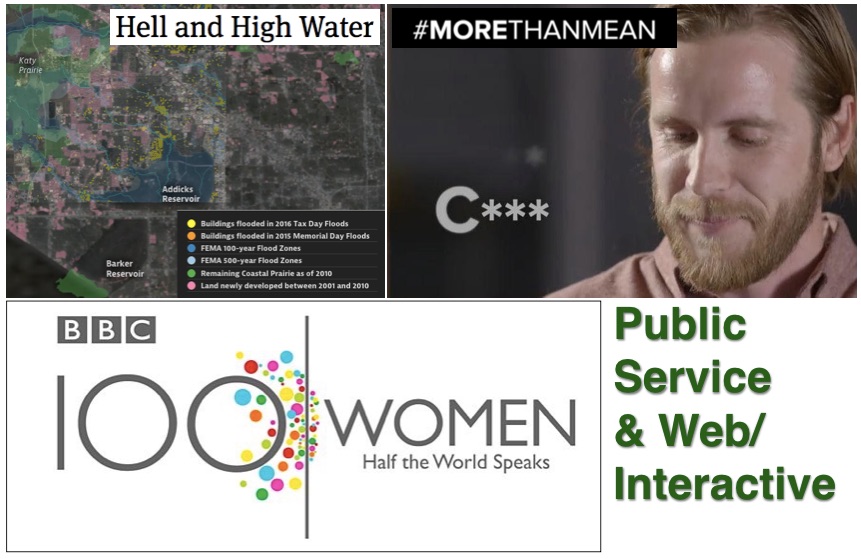
Winners
- #MoreThanMean
- Hell and High Water
Finalists
- Ask the Storybots
- 100 Women
- Tumble Leaf
Tumble Leaf has been a favorite of mine since it began. So much children’s television, even a lot of the stuff I love, is jacked up on caffeine, meth, and a pre-schooler’s undying energy level. I really appreciate, therefore, how Tumble Leaf is mellow and gentle, while not ever becoming boring. The animation is gorgeous in its stylized nature, its small lessons about science and math are nice, and everyone treats each other well. This is preeminently television that you can trust if you need to leave the room while your 3 year-old is watching, and it’s also chilled enough that you can watch it tired in the morning without worrying that it’ll wake you rudely. Amazon has put a fair bit of effort and money into its kids programming, and this is its star.
I also want to comment on #MoreThanMean, a little engine that could inasmuch as it was produced largely for the cost of the pizza they fed the people making it, yet here it is with a Peabody Award. A simple repurposing of Jimmy Kimmel’s exercise of reading mean tweets, it asks several men to read outright abusive tweets about female sportscasters to their faces. A strong rebuke to troll culture, especially within sports, it’s moving, smart, and it circulated far and wide. If you didn’t see it, do so.
Finally, Hell and High Water told us it was coming. Reading the site after Hurricane Harvey is hard, since it shows all that we know and knew about the risks of flooding in Houston, and about the effects of climate change, yet all that our government seems only too happy to ignore. When I find myself thinking “if only I could show this to someone in power!” about a Peabody entry, that’s usually a great sign, as it was here.
I didn’t discuss every winner and finalist, but please don’t assume I therefore dissent or disagree with the others. Inevitably, we all have our favorites, and I wanted to highlight some of them here. But it’s an amazing slate, all worthy of being watched, listened to, and/or read.

